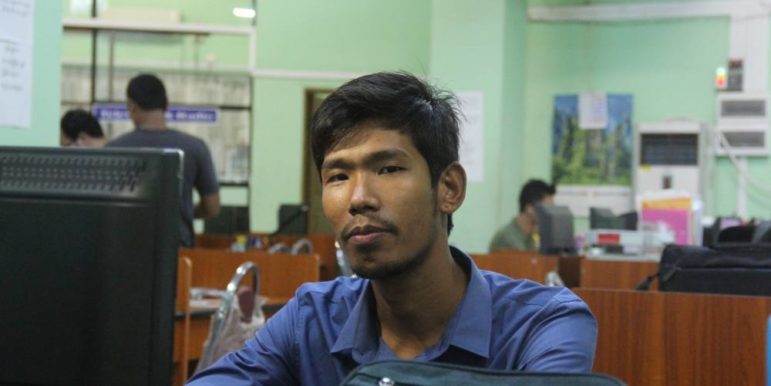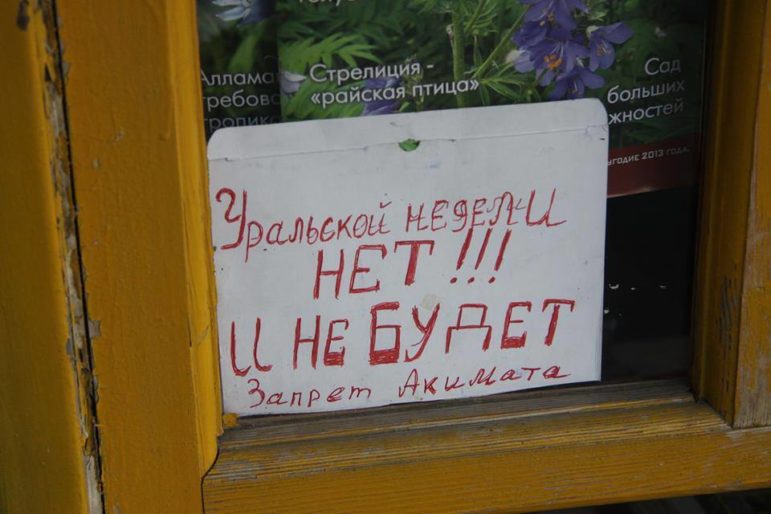

A Myanmar Newsroom that Covers Buddhist Extremism
When monks in Myanmar threatened to kill Min Min for his reporting on Buddhist nationalism, they had hoped to scare him into silence. Instead, the experience inspired him to start his own news organization.
The journalist was a senior editor at a local newspaper in Myanmar’s Rakhine state in early 2015 when he wrote a story about a nationalist protest in the state capital.
“Have Buddhist extremists taken control in Sittwe?” his headline asked. A week later he got an answer, of sorts, when a group of monks demanded Min Min meet them to explain his article.
“If the newspaper doesn’t give us an explanation, we might kill them or destroy their building,” one of the monks told his friend, who went to the meeting in his place.
Min Min stood his ground, insisting that his article was balanced and fair. But the owner of the newspaper refused to take his side.
“That made me realize I should do my own stuff,” he tells Splice. “I realized there were a lot of legitimate facts being suppressed for political reasons… if I’d stayed it would have been very difficult to speak the truth.”
Getting to the Root of Issues
 His answer to the fear and self-censorship muzzling reporting in Rakhine was to co-found the Root Investigative Agency, or RiA, a magazine and website focusing on human rights and rule of law, based in the Rakhine State capital Sittwe near the Bangladesh border.
His answer to the fear and self-censorship muzzling reporting in Rakhine was to co-found the Root Investigative Agency, or RiA, a magazine and website focusing on human rights and rule of law, based in the Rakhine State capital Sittwe near the Bangladesh border.
The outlet’s first story in September 2015 highlighted the fact that while stateless Rohingya Muslims are branded “immigrants” from Bangladesh and widely reviled in Rakhine, Buddhist migrants from Bangladesh have been welcomed and even given Myanmar citizenship.
“What we do is not appreciated by nationalists and racists,” says Tin Aung Moe, a co-founder of RiA who is in charge of layout and design. “So of course guys with those attitudes dislike us and threaten us.”
The agency opened with less than a dozen staff, Min Min says, but some have since left due to safety concerns. They were subject to persistent online death threats from people who regard them as “traitors.”
“At first I thought it was just words,” says Min Min. Then, late one evening in March 2016, someone detonated a small bomb outside his house, which also served as RiA’s office. No one was in at the time, but shrapnel from the explosion tore holes through the building’s walls.
Min Min believes the attack was likely in response to RiA’s coverage of allegations that a Rakhine nationalist insurgent group, the Arakan Army, was involved in the narcotics trade. The outlet had also reported allegations that the insurgents, along with Myanmar’s military, were forcing villagers to work as porters.
Attacks on Journalists Mounting
Since the start of the Myanmar military’s brutal campaign against Rohingya in northern Rakhine last August, the situation has become increasingly perilous for media working in the state.
Last month a journalist who has worked with the Democratic Voice of Burma covering Rakhine narrowly survived being stabbed by unknown assailants in Sittwe.
And one of Min Min’s former RiA colleagues, Kyaw Soe Oo, is now facing 14 years in prison on official secrets act charges related to his reporting for Reuters on the Rakhine crisis. He and his colleague Wa Lone were arrested, it is believed, just as they were about to break a story revealing a mass grave in northern Rakhine.
Min Min fled to Yangon, the Myanmar capital, after the 2016 bomb attack, but has since returned to continue his work — despite the risks.
“RiA was founded to publish news about Rakhine state,” he says. “You can’t really write about Rakhine state without being here.”
It’s a pattern for Min Min. When religious riots struck Sittwe in 2012, many of his friends and neighbors fled the violence. But he stayed behind.
“It is important to face our fears,” he says, “rather than running from them.”
This post first appeared on The Splice Newsroom website and is reproduced here with permission.
 Joshua Carroll is a freelance reporter based in Yangon, Myanmar, where he reports on human rights and development. His work has been featured in The Daily Beast, The Guardian, The Times (of London) and elsewhere.
Joshua Carroll is a freelance reporter based in Yangon, Myanmar, where he reports on human rights and development. His work has been featured in The Daily Beast, The Guardian, The Times (of London) and elsewhere.









